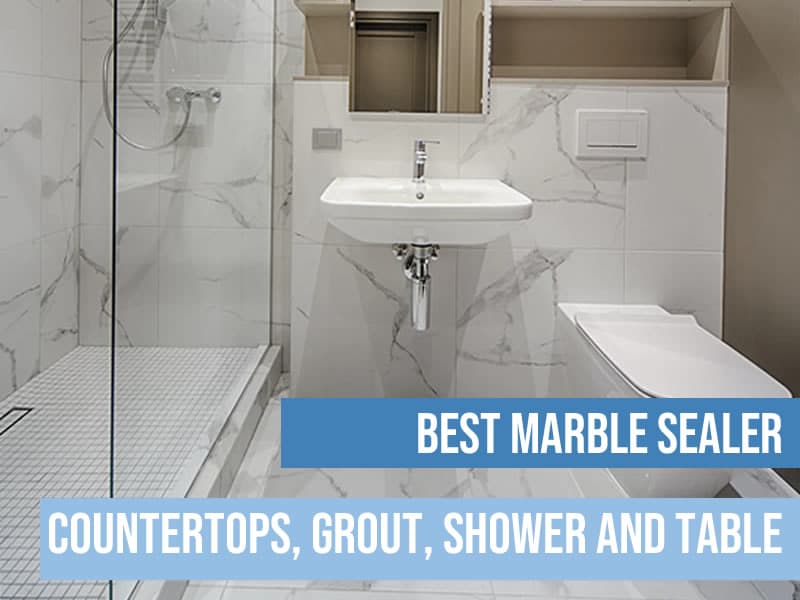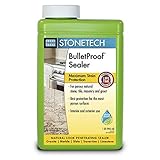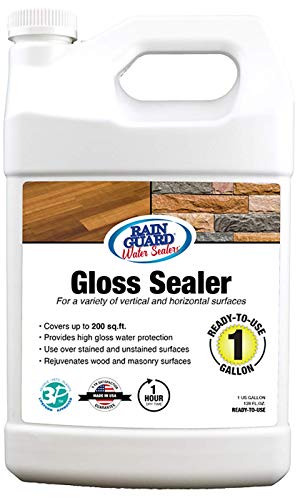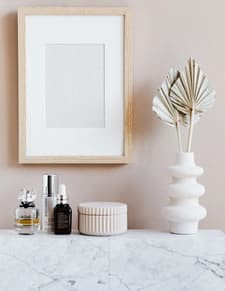
Marble is a natural material that makes a great surface for your countertop. But at the same time, they can also be porous and soft. This means they can absorb liquids, which can damage or get them stained.
It is because of this reason they need to be sealed. The advantage of using the best marble sealer is that it helps protect your marble from getting etched or stained. You need to apply it multiple times for maximum protection.
Top Rated Marble Sealer
I find it extremely hard to keep my marble floors and countertops impeccable day after day. I am sure many of you can relate to it.
This is why it is important to use a top-rated marble sealer to protect the surface from damage. Not just that, but it also makes it waterproof.
Trying to get rid of stubborn stains from marble surfaces can be tough. If you make the mistake of using any harsh or toxic chemicals, you will end up damaging your marble. The right way to take care of your marble surfaces is to protect them with multiple layers of sealer.
I can understand how confusing it gets to choose the best marble sealer in the market.
To save your precious time, I have researched and reviewed some of the best marble sealers in the market. Go through the details and then pick the one that you find is suitable for your purpose.
| Image | Title | Buy |
|---|---|---|
 Top
Top | Stain-Proof Premium Impregnating Sealer for Stone, Tile, Concrete, Grout | Buy On Amazon |
 Top
Top | StoneTech BulletProof Sealer, 1-Quart (.946L) | Buy On Amazon |
 Top
Top | Tuff Duck Granite, Grout and Marble Sealer 1 Quart Stone Tile | Buy On Amazon |
 Top
Top | Rain Guard Water SP-1103 Gloss Ready to Use - Covers up to 200 Sq. Ft | Buy On Amazon |
 Top
Top | Tenax Ager Color Enhancing Granite, Marble & Stone Sealer | Buy On Amazon |
When it comes to buying it, there are different types available. There are water-based sealers, solvent-based sealers, topical sealers, penetrating sealers, wet look sealers, and color-enhancing sealers.
Besides the type, you also need to consider the versatility of the sealer. For instance, whether it can be used indoors, outdoors, or both places.
Other important factors to consider are ease of application, curing time, and product coverage. All these factors are crucial to choose the best marble sealer.
A marble sealer is the best way to maintain your marble countertops. It protects it from staining and getting etched. If you are looking for the best marble sealer and wish to know how it works, you are in the right place. In this guide, I am going to cover all that you need to know about this product.
Drytreat Stain Proof Plus Premium Impregnating Sealer
 Check price on Amazon
Check price on Amazon
Drytreat Stain Proof Plus is one of my favorites out there. It is a premium-grade sealer that is designed for premium stain protection.
It helps protect against oil and water-based stains, picture framing, efflorescence, and salt damage. Surfaces treated with this sealant are easier to clean and maintain.
You can apply this one natural stone, tiles, brick, pavers, concrete, and grout including building facades, walls, floors, countertops, showers, and other areas. It comes with stain-proof technology and creates the deepest protection barrier.
- Premium grade
- Permanent-bonding sealer
- Treated surfaces easy to clean
- None
Laticrete Stonetech Bulletproof Sealer
 Check price on Amazon
Check price on Amazon
Laticrete Stonetech Bulletproof is yet another great option you can go for. This is a unique, stain protector designed for porous natural stone and grout. It provides maximum protection for natural stones and covers up to 100 square feet.
It is formulated with advanced, water-based fluoropolymers, which protects up to 5 years on interior surfaces. It is an advanced formula that bonds with stone for improved wear resistance.
It features a penetrating micro-bond that keeps your stone or tile protected against tough oil and water-based stains. Not just that, but it also cleaning stone easy. Also, it preserves the natural look of your stone and tile. It can be applied to natural stone such as marble, granite, limestone, slate, and others.
- Can be used on multiple surfaces
- Great for preventing oil-based and water-based stains
- Improved wear resistance
- Coverage not good enough
Tuff Duck Granite, Grout, and Marble Sealer
 Check price on Amazon
Check price on Amazon
If you are looking for maximum protection, then you should go for Tuff Duck Marble Sealer. It is great for marble, granite, grout, limestone, and other natural stones.
This penetrating sealer doesn’t affect the natural appearance of your stone tile. It provides complete protection to your marble tile.
It comes with twice the active ingredient to ensure proper protection even with a single coat. The sealer is so strong that it can protect up to 3 years on exterior surfaces and 5 years on interior surfaces.
This is a non-acidic formula that provides coverage for up to 200 square feet. It is developed by Rocklinite Labs and is specially formulated to protect against water and oil-based stains. It is compatible with marble, granite, terrazzo, travertine, and other porous stone surfaces.
- Coverage up to 200 square feet
- Non-acidic formula
- Doesn’t affect the natural service
- Not long-lasting
Rain Guard Water Sealers SP-1103 Gloss
 Check price on Amazon
Check price on Amazon
If you are looking for a high gloss marble sealer, you can consider getting this one. It is one the best marble sealers I come across. It gives a glossy finish to your marble surface. Unlike most other products, this one is safe to use.
This masonry is made of a water-based formula. It has a low odor and low VOC. This is a non-yellowing solvent-based sealer that protects against weathering, salt, dirt, and cold temperatures.
Not just that, but it can also resist damage from UV rays. It works well on both stained and painted surfaces. With this sealer, you can get five-year satisfaction.
- Has low VOC
- Low odor
- Can resist damage against UV rays
- None
Tenax Ager Color Enhancing Granite
 Check price on Amazon
Check price on Amazon
Lastly, we have the Tenax marble sealer. The specialty of this sealer is that it helps enhances color of the stone surface.
It leaves a permanent wet look that makes the stone surfaces look more attractive. One quart can cover up to 160-180 square feet. Unlike other sealers, it doesn’t take much time to dry.
It creates a water-repellent effect within 24 hours from application. It is suitable for polished surfaces such as marble, granite, and stone of all types.
You can use it for indoor and outdoor use. It helps enhance the color of the stone. Once it dries, it provides maximum protection against stains.
- Protection against stains
- Dries quickly
- Good coverage
- Leaves streaks after application
Sealer For Marble Tile
Whether it is marble flooring, countertops, or marble shower tile, they all need protection. Since marble tile is a soft and porous material, it absorbs water quickly. Over time, this can damage or stain the marble. To prevent this from happening, you need to use the best sealer for marble tile.
Even the best marble sealer that you can get doesn’t prevent stains from happening. Instead, it helps buy time from a stain settling into the soft surface. Some sealers protect against etching, which is caused due to acid and calcium carbonate reactions.
Sealing marble tile in the shower and kitchen is important because they are frequently exposed to water. If not wiped quickly, it can seep into the pores of the stone and damage it over time.
Speaking of sealers, there are different types available. But if you are looking for the best sealer for marble tile, I would recommend you to go for a water-based impregnating sealer.
You can also go choose a spray-on sealer, which is convenient and quick. But the problem is they are generally not as effective as liquid-based sealers.
You will also find sealers that are made specifically for honed marble and polished marble. You should select the sealer based on the type of marble tile.
How to seal marble tile?
Not all marbles are delicate, but most of them are highly absorbent. This is why they are easy to etch and stain.
Polished marble doesn’t need sealing before applying grout. But marble-like tumbled marble, they need sealing before grouting.
In this section, I will tell you how to seal marble tile before grouting. Go through the steps carefully and you will know what to do.
Steps to sealing marble tile before grouting:
- Use a mild, pH-neutral cleanser or a commercial stone cleaner to spray the tiles. Now wipe the marble clean using a damp cloth. Then wipe it again with a dry cloth and let the marble dry.
- Sponge a thick, even layer of sealer onto the surface and let it soak for at least 15 minutes. When it starts to dry out, apply more to keep the surface wet.
- Take a dry cloth and wipe the excess sealer off after 15 minutes. Now, wait for an hour while the sealer gets absorbed.
- After that apply a second coat of sealer and repeat the process.
- Allow the sealer to dry for up to 40 minutes before you walk on the floor. You need to wait for the length of time mentioned by the manufacturer for it to cure before you apply grout.
Marble Countertop Sealer
 If you have marble countertops, you should keep them sealed. But for this, you need to first find the best marble sealer that will get the job done.
If you have marble countertops, you should keep them sealed. But for this, you need to first find the best marble sealer that will get the job done.
With so many options available in the market, it often gets confusing to choose the right one. To help you out, I have explained the different types of marble countertop sealers below.
Water-based sealers: The best marble countertop sealer would be a water-based one. This type of sealer has low-VOC and produces very little odor after application.
They fill up the open pores to prevent staining. By applying water-based sealants on your tiles and countertops you can keep them protected.
Solvent-based sealers:
Solvent-based sealers are high-VOC and leave toxins in the air after application. Unlike water-based sealers, solvent-based sealers are not that environment-friendly.
VOCs:
VOCs are basically “volatile organic compounds.” These are toxins produced from certain chemicals, including paints, solvents, and dyes used in carpeting.
It creates toxic fumes after application, so you should keep that in mind. This could be a problem for someone who has breathing problems such as asthma or COPD.
When should you seal your marble countertops?
Many of you want to know when should you seal your marble countertops. I will tell you a very simple way to determine whether your marble needs to be sealed.
- Pour 1/4 cup water onto a small area of the marble.
- Wait for about 5-10 minutes and then wipe it off.
- Now dry the area with a soft cloth.
Most experts recommend sealing your marble countertop every 3-6 months. However, this may vary depending on the quality and color of the marble. Also, make sure that you get the best marble countertop sealer.
How to seal marble countertops?
In this section, I will be explaining how to seal marble countertops. If you are planning to DIY it at home, you should follow the steps below.
Perform a water test
You need to first determine whether your marble countertop needs sealing or not. For this, you need to perform a water test. Pour water on various spots of the counter. If any of the spots show signs of discoloration within 30 minutes, then it needs sealing.
Clean your marble countertop
Use a granite or marble cleaner to prepare the surface for sealing. If you have any stains on the countertop, get rid of them first. For coffee stains, you should soak cotton balls with bleach and let them sit overnight.
After that rinse it with water. For oil stains, apply baking soda and acetone paste, let it sit for 24 hours, and rinse with water.
Apply sealant
If you are using a natural-stone sealant, you can simply spray it right on the marble and wipe it to ensure it penetrates the surface.
You should spray the sealant in 3-foot sections and work it in before it dries. Allow the sealant to cure for at least 24 hours before moving to the next step.
You should run a water test a few weeks after the first sealant application. If the water doesn’t penetrate, your seal is strong.
For those who want to know how often to seal marble countertops, the ideal time is every 3-5 months. Now that you know how to seal marble countertops, it should be easy for you.
Marble Sealer For Shower
If you have marble tiles in your shower, they should be maintained regularly. Since it is exposed to water frequently, you should use a marble sealer for a shower to protect it from damage.
However, if you have polished marble, it doesn’t require any sealing. But for rough-cut marble, need sealing because they are more porous and softer than polished marble.
By sealing your marble in the shower, you can prevent it from water stains and damage. Sealers cannot protect your marble for a lifetime. This is why you need to renew the sealing every few months.
Here are some important things you should do to maintain your marble:
- Seal it every 6 months
- Clean it weekly with a marble-specific cleaner
- Make a natural poultice to remove stains
- Squeegee any sitting water
Marble Table Sealer
If you have a marble table in your dining room, you need to take all the steps to maintain it properly. After all, you wouldn’t your expensive piece to get damaged due to negligence.
One of the best ways to maintain your marble table is by sealing it. But before this, you need to know the type of marble it is made of.
Marble is a porous rock and has natural flaws. Just like every other thing, it wears off a bit over time. To prevent it from occasional scratches and other damages, you need to use a marble table sealer.
You need to choose the marble table sealer based on the type of marble it is made of.
Now the question is how to seal marble table. Well, you should seal your table as soon as you get it home. It will create a waterproof barrier that will protect it from damage.
Once applied correctly, you can pick up spills easily. To check how your seal is holding up, splash a bit of water on the surface.
If the water beads, your coating is strong. But if it doesn’t, then you will have to apply a fresh coat of sealer.
You should seal every 6-12 months. This will keep your marble table protected and also make it last longer. Just get the best marble sealer online or from my list above and you’re good to go.
Marble Floor Sealer
Marble flooring tiles are used in several places in your house. They are popular in the bathroom, kitchen, laundry room, and even as decorative accents for showers and walls.
If you have marble flooring in your house, you need to keep it maintain from time to time. This can be done by sealing it with a marble floor sealer.
Speaking of marble floor tile sealer, there are different types available. But you need to choose the one that is right for your marble flooring.
Marble Tile Topical Sealers
Topical sealers of acrylic or urethane are applied to the top of a marble tile surface. Although they provide protection, they wear out quickly, especially if applied to high-traffic areas. This is why you need to reseal it frequently.
Marble Tile Penetrating Sealers
This type of sealer penetrates deep into the stone. Not just that, but they are also quite effective in repelling oils and liquids.
The good thing about penetrating sealers is that they last longer. Also, they need to be reapplied every six months to a year.
Marble Tile Impregnating Sealers
This is perhaps the best type of marble sealer you will find. This type of sealers bond to the marble tile or slab at a molecular level. It doesn’t affect the surface colour and also repels water and oils from inside the stone.
How to apply marble sealer?
I have already discussed how to apply the best marble sealer for different things including marble countertop, table, shower tile, and flooring. It’s time, we look into some other important details.
To determine whether you need to apply a sealer or not, you should perform the water drop test or mineral oil test. I have explained the steps for both the process below.
Water Drop Test
For the water drop test, you need to follow these steps:
- At first, sprinkle a few drops of water on the marble counter.
- Now check to see whether the stone darkens and absorbs the water. If the water gets absorbed in four minutes or less, the stone needs to be resealed.
Mineral Oil Test
Here is what you need to do to perform the mineral oil test:
- First, put a few drops of mineral oil on the counter.
- Wait for at least 10 minutes, then wipe off the mineral oil.
- If you notice a dark stain after wiping off the mineral oil, it’s time to reseal your countertops.
Q&A
What do you use to seal marble?
Natural-stone sealant can be sprayed right on the marble. To ensure that it has penetrated the surface through the pores, wipe it using a dry lint-free cloth. You need to spray the sealant in 3-foot sections and wipe it before it dries.
Can I seal marble myself?
Yes, you seal your marble flooring or countertop at home without any professional help, provided that you know the right steps. Also, you need to choose the right sealer for your marble.
What happens if you don’t seal marble?
When you leave your marble without sealing, water penetrates the stone and leaves behind watermarks, which gives a dirty appearance to the stone. Not just that, but it also damages the marble over time.
Is Marble OK for shower walls?
Whether you like it modern or classic, rustic or sleek, marble always looks great in your bathroom. If you have laminate or natural wood accents, you should get marble tiles with a brushed finish. For those who have chrome or brushed steel fixtures, you should go for polished marble for your shower walls.
How do you keep marble countertops shiny?
You can keep your marble countertop shiny by applying multiple coats of sealant on the surface.
Another traditional method is to apply baking soda. Mix three tablespoons of baking soda with one quart of water and apply it to the surface. Let it air dry for several hours and then wipe it off.
Conclusion
Marble are natural materials that look great in different places of your house. But they tend to get scratched or stained over time, especially the ones that are frequently exposed to water.
To keep them protected, you should seal your marble flooring, table, countertop, and tile. You should get the best marble sealer and apply it every 6 months to maintain your marble.
